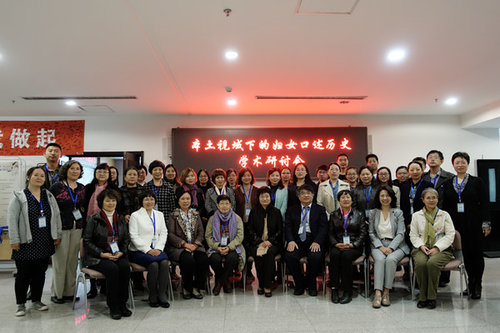CWU Wraps Up Seminar on Women's Oral History
 |
A seminar on women's oral history was held at China Women and Gender Library (CWGL) in China Women's University (CWU) on October 12. Some 50 experts and scholars from domestic universities participated in the event.
CWU Vice-President Liu Meng attended the meeting and delivered a speech. Liu welcomed the experts and introduced them CWU's management philosophy, curriculum establishment and talent cultivation targets.
Liu pointed out that the building of CWGL is closely related to women's oral history. Women's oral materials are important parts of the library's featured resources. Liu hoped that researchers could dig deeper and make the most of the existing materials.
At the same time, Liu urged those present to study thoroughly overseas women's oral history, combine the native knowledge with some foreign tools and indigenize the research method, theory, model and value orientation, so as to promote the localization of women's oral history research and guide the further development of CWGL in the future.
Topics of the meeting included not only thinkings on women's oral history theory, but also comments on relevant published works. Participants also exchanged opinions on women's oral materials in border and ethnic minority areas and discussed on women's identity and fertility desire. In addition, from the perspective of the development and construction of information resources, those experts studied how to incorporate women's oral materials into the collection of CWGL.
With regard to the oral history theory and paradigm of women in China's mainland, Du Fangqin, professor of Tianjin Normal University, introduced the development history, theory and practice model of Chinese women's oral history.
Hou Jie, professor of Nankai University, explored the value of oral histories in Chinese cultural traditions and explored the subjectivity of women. Professor Chang Yinting from Shanxi Normal University, researcher Liu Xiaoli and researcher Li Weimin from Shanxi Academy of Social Sciences, analyzed some published works concerning women's oral history.
Li Jinheng, an expert from Renmin University of China, who interviewed several female senior engineers, summarized that such “minority” are well worth the research.
Wang Rui and Hu Dan from Central China Normal University analyzed female cadres' role in policy implementation in rural areas, their executive strategy and gender-based predicament of identity through interviews with female cadres during the period of collectivization.
CWU teacher Zhou Mengmeng expressed her hopes that the oral history of women could give underprivileged women access to rights protection. Associate researcher Guo Ping of Tianjin University held that the adaptation of women inheritors to their new roles and the realization of their identity among their relatives, friends, families and society in intangible cultural heritage protection is a complicated process full of interaction and challenges.
Yu Jinghua from Shihezi University analyzed the life experiences of the second generation of women in Xinjiang Production and Construction Corps (XPCC). Wang Ying, a CWU teacher, explored the division of labor pedigrees of women in XPCC under a collectivist model.
Professor Zhong Jinlan of Jiaying College pointed out the research direction of Hakka women's oral history in the future. Yu Chenglong, a professor from Central China Normal University, expressed his opinion that women's child-bearing concept convert from production-oriented to consumption-oriented in the period of collectivization and this change of concept is the inevitable result of individuals adapting to the social structure.
Wang Xiaoyun from the National Academy of Chinese Theatre Arts analyzed the construction of social relations behind women's surgical abortion.
Peng Yan, associate professor from the library of Jishou University, came up with a series of visions for the library's development from the perspective of ethnic oral history. Xu Youwei, a professor from the Department of History at Shanghai University, said that researchers should carry out careful planning before studying oral history. Yin Peili, a researcher at the Chinese Modern Literature Museum, emphasized the urgency, uniqueness and methods of cataloging the oral history materials. CWU teacher Li Huibo put forward her opinion to promote the work of CWGL concerning women's oral history.
This seminar is of great significance to CWGL's collection, development and research of women's oral history.
(Source: China Women's University/Translated and Edited by Gender Study Network)
Please understand that womenofchina.cn,a non-profit, information-communication website, cannot reach every writer before using articles and images. For copyright issues, please contact us by emailing: website@womenofchina.cn. The articles published and opinions expressed on this website represent the opinions of writers and are not necessarily shared by womenofchina.cn.

 京公网安备 11010102004314号
京公网安备 11010102004314号